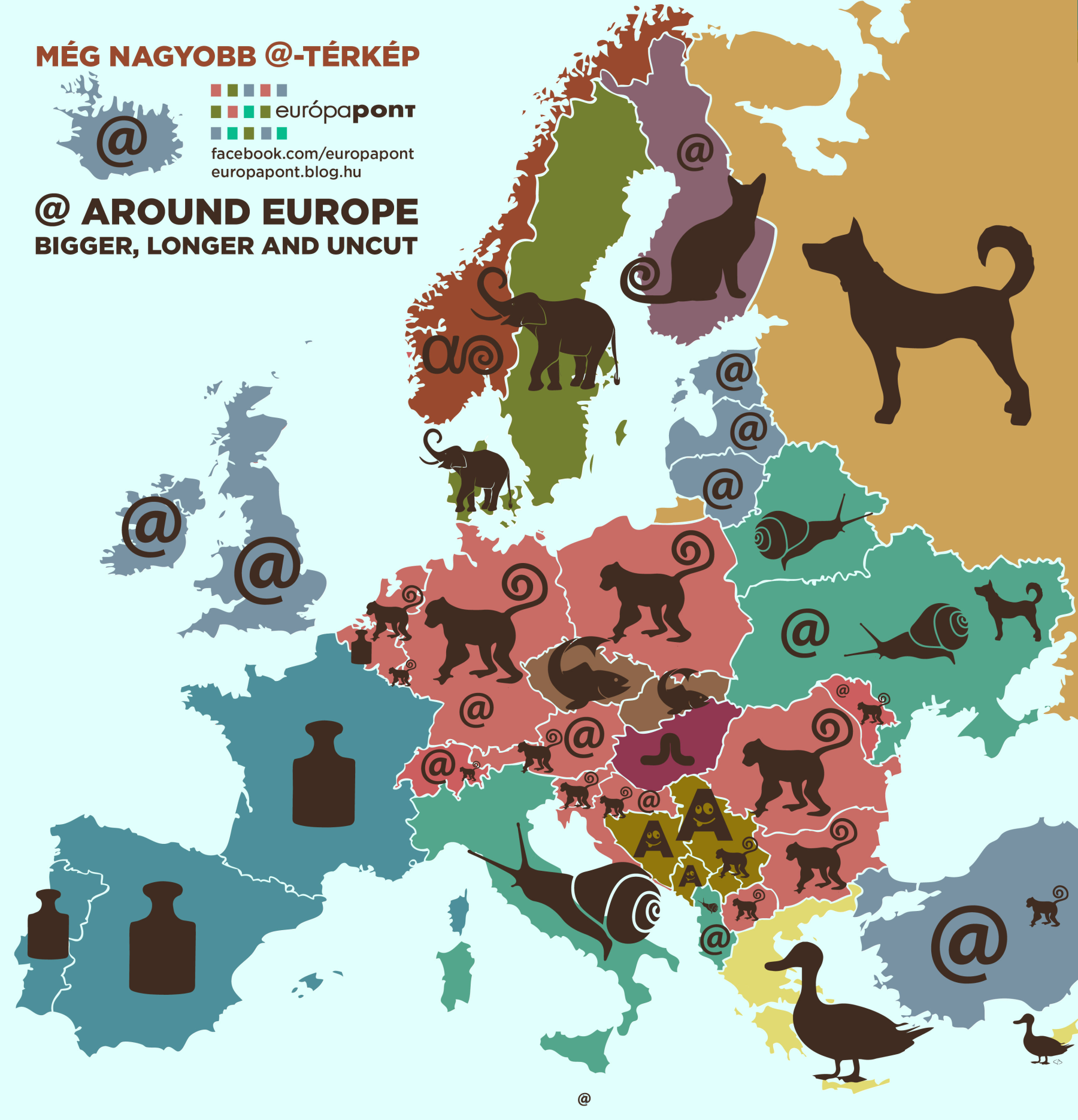Taking into consideration the many local and even international feedbacks and remarks we received regarding our first “Big @-map”, we compiled a new, extended (“bigger, wider and uncut”) version of it. On this new map you can not only find the names of the @-sign in the official languages of the European Union, but in further European languages as well. The sources were Heroidos.com and Wikipedia – of course,besides your comments we got on various European forums.
Calling the @sign “at”, as the English says, is very common and still spreading in many European countries. In our new collection we focused on other, special and locally used versions (if there were any) which are often used and understood by many in a given country besides the English “at”.
We are still open to your comments – hope you like it! :-) (Click on the map for a larger view)
- Albania: at and kiocola after the Italian chiocciola (snail)
- Austria: mostly at, sometimes Klammeraffe (spider monkey)
- Belarus: сьлімак / slimak (snail)
- Belgium: “at” and in Wallonia arobas (old weight unit); in Flanders apenstaartje (monkey’s tail)
- Bosnia and Herzegovina: лудо А / ludo-a („crazy a”)
- Bulgaria: кльомба / klyomba – ("a badly written letter"), or маймунско а / maymunsko a, meaning "monkey A"
- Croatia: mostly „at”, or manki after the English word „monkey”
- Cyprus: παπάκι / papaki (duckling)
- Czech Republic: zavináč (rollmops)
- Denmark: snabel-a (elephant trunk-a)
- Estonia: „at”
- Finland: „at”, ät-merkki, (at-sign) or kissanhäntä (“little cat’s tail”) or miukumauku (“meow-meow”)
- France: arobase (old-fashion weight unit stemming from an arabic word)
- Germany: mostly „at”, sometimes Affenschwanz („monkey tail”) or Klammeraffe (spider monkey)
- Greece: παπάκι / papaki (duckling)
- Hungary: kukac (maggot or worm)
- Ireland: „at”
- Italy: „at”; chiocciola (snail)
- Iceland: at merkið, hjá-merkið (at-sign)
- Latvia: „at” or „et”
- Lithuania: „at”, or according to the Lithuanian pronounciation „eta”
- Luxembourg: mostly „at”; formerly Afeschwanz ("monkey tail"), or sometimes arobas
- Macedonia: мајмунче / majmunce (“little monkey”)
- Malta: „at”
- Moldova: „at” or a rond („round a”), or coadă de maimuţă (“monkey tail”)
- Montenegro: ludo-a („crazy a”)
- Netherlands: apenstaartje (“monkey tail”)
- Norway: alfakrøll or krøllalfa (“curly alpha”)
- Poland: małpa / małpka (“little monkey”)
- Portugal: arroba (old weight unit)
- Romania: „at”; a rond („round a”) or coadă de maimuţă („mokey tail”)
- Russia: собака / sobaka (dog)
- Serbia: лудо А / ludo-a („crazy a”); мајмунче / majmunce (“little monkey”)
- Slovakia: zavináč (rollmops)
- Slovenia: afna (“little monkey”)
- Spain: arroba (old weight unit)
- Sweden: snabel-a, ("[elephant's] trunk A")
- Switzerland: „at” or Affenschwanz (“monkey tail”)
- Turkey: „at”, or majmun (monkey)
- Ukraine: „at” / ет; or равлик / ravlik (snail) or песик / pesik (“little dog”)
- United Kingdom: „at”
A bejegyzés trackback címe:
Kommentek:
A hozzászólások a vonatkozó jogszabályok értelmében felhasználói tartalomnak minősülnek, értük a szolgáltatás technikai üzemeltetője semmilyen felelősséget nem vállal, azokat nem ellenőrzi. Kifogás esetén forduljon a blog szerkesztőjéhez. Részletek a Felhasználási feltételekben és az adatvédelmi tájékoztatóban.







